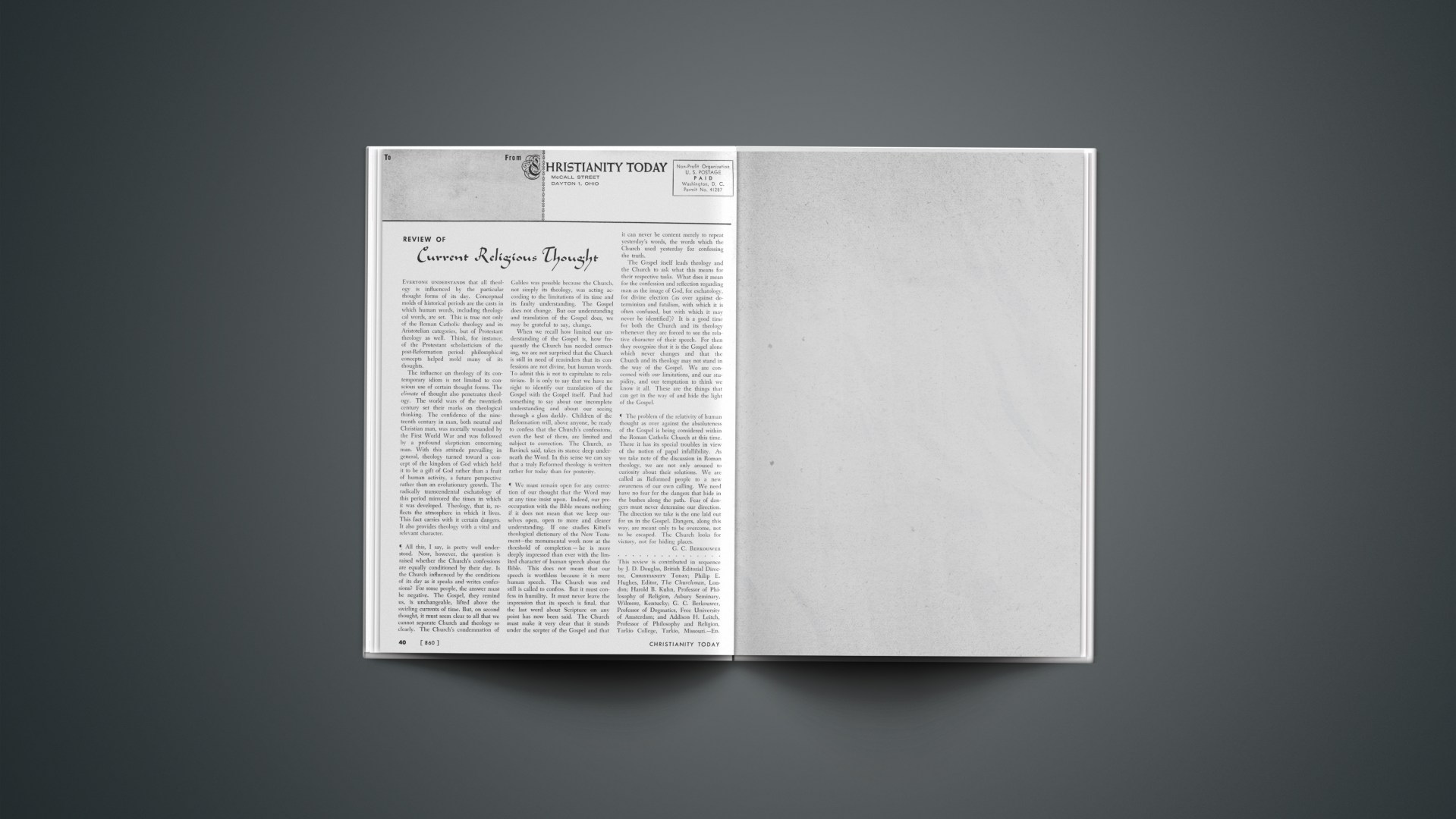Everyone understands that all theology is influenced by the particular thought forms of its day. Conceptual molds of historical periods are the casts in which human words, including theological words, are set. This is true not only of the Roman Catholic theology and its Aristotelian categories, but of Protestant theology as well. Think, for instance, of the Protestant scholasticism of the post-Reformation period: philosophical concepts helped mold many of its thoughts.
The influence on theology of its contemporary idiom is not limited to conscious use of certain thought forms. The climate of thought also penetrates theology. The world wars of the twentieth century set their marks on theological thinking. The confidence of the nineteenth century in man, both neutral and Christian man, was mortally wounded by the First World War and was followed by a profound skepticism concerning man. With this attitude prevailing in general, theology turned toward a concept of the kingdom of God which held it to be a gift of God rather than a fruit of human activity, a future perspective rather than an evolutionary growth. The radically transcendental eschatology of this period mirrored the times in which it was developed. Theology, that is, reflects the atmosphere in which it lives. This fact carries with it certain dangers. It also provides theology with a vital and relevant character.
All this, I say, is pretty well understood. Now, however, the question is raised whether the Church’s confessions are equally conditioned by their day. Is the Church influenced by the conditions of its day as it speaks and writes confessions? For some people, the answer must be negative. The Gospel, they remind us, is unchangeable, lifted above the swirling currents of time. But, on second thought, it must seem clear to all that we cannot separate Church and theology so clearly. The Church’s condemnation of Galileo was possible because the Church, not simply its theology, was acting according to the limitations of its time and its faulty understanding. The Gospel does not change. But our understanding and translation of the Gospel does, we may be grateful to say, change.
When we recall how limited our understanding of the Gospel is, how frequently the Church has needed correcting, we are not surprised that the Church is still in need of reminders that its confessions are not divine, but human words. To admit this is not to capitulate to relativism. It is only to say that we have no right to identify our translation of the Gospel with the Gospel itself. Paul had something to say about our incomplete understanding and about our seeing through a glass darkly. Children of the Reformation will, above anyone, be ready to confess that the Church’s confessions, even the best of them, are limited and subject to correction. The Church, as Bavinck said, takes its stance deep underneath the Word. In this sense we can say that a truly Reformed theology is written rather for today than for posterity.
We must remain open for any correction of our thought that the Word may at any time insist upon. Indeed, our preoccupation with the Bible means nothing if it does not mean that we keep ourselves open, open to more and clearer understanding. If one studies Kittel’s theological dictionary of the New Testament—the monumental work now at the threshold of completion—he is more deeply impressed than ever with the limited character of human speech about the Bible. This does not mean that our speech is worthless because it is mere human speech. The Church was and still is called to confess. But it must confess in humility. It must never leave the impression that its speech is final, that the last word about Scripture on any point has now been said. The Church must make it very clear that it stands under the scepter of the Gospel and that it can never be content merely to repeat yesterday’s words, the words which the Church used yesterday for confessing the truth.
The Gospel itself leads theology and the Church to ask what this means for their respective tasks. What does it mean for the confession and reflection regarding man as the image of God, for eschatology, for divine election (as over against determinism and fatalism, with which it is often confused, but with which it may never be identified)? It is a good time for both the Church and its theology whenever they are forced to see the relative character of their speech. For then they recognize that it is the Gospel alone which never changes and that the Church and its theology may not stand in the way of the Gospel. We are concerned with our limitations, and our stupidity, and our temptation to think we know it all. These are the things that can get in the way of and hide the light of the Gospel.
The problem of the relativity of human thought as over against the absoluteness of the Gospel is being considered within the Roman Catholic Church at this time. There it has its special troubles in view of the notion of papal infallibility. As we take note of the discussion in Roman theology, we are not only aroused to curiosity about their solutions. We are called as Reformed people to a new awareness of our own calling. We need have no fear for the dangers that hide in the bushes along the path. Fear of dangers must never determine our direction. The direction we take is the one laid out for us in the Gospel. Dangers, along this way, are meant only to be overcome, not to be escaped. The Church looks for victory, not for hiding places.









